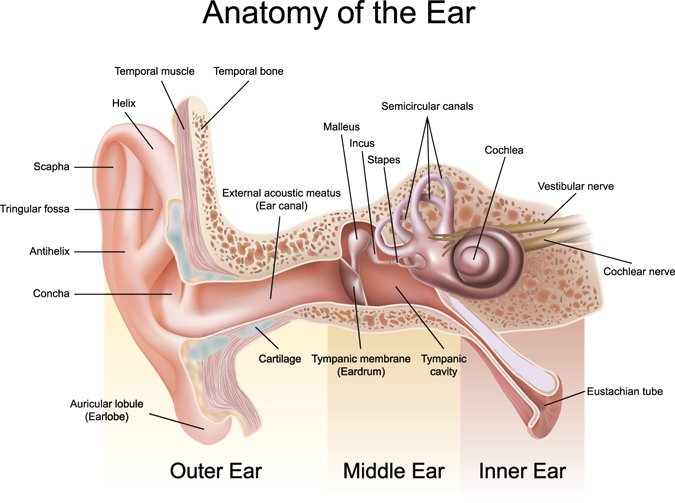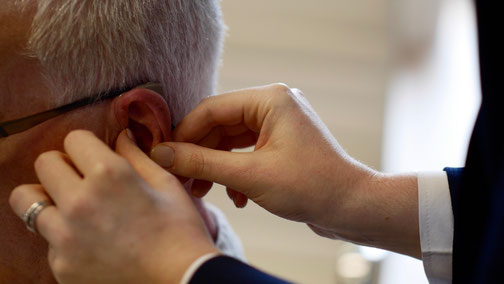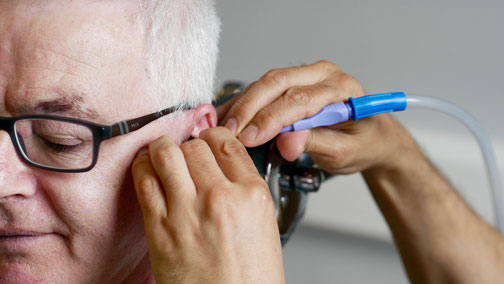About Hearing Loss

To begin to understand hearing loss, it is first necessary to have a basic understanding of how we hear. There are two pathways by which sound waves produce the sensation of hearing:
Air Conduction - Sound waves collected by the outer ear move down the ear canal and hit the eardrum causing it to vibrate. The three bones in the midlle ear (malleus, incus and stapes) are moved and the incus pumps in and out of the fluid in the inner ear or cochlea. This results in a fluid wave that corresponds to the sound wave originally collected by the outer ear. The cochlea contains thousands of hair cells which are moved by the wave and when they are stimulated sufficiently a nerve impulse is created. This is transported to the brain via the auditory nerve where it is interpreted as sound.
Bone Conduction - This occurs when a sound wave or other source of vibration cuses the bones of the skull to vibrate. These vibrations are transmitted to the fluid in the cochlea and a wave is created which results in hearing.

Hearing Loss Causes
There are two basic types of hearing loss; conductive and sensorineural.
Conductive causes
These involve physical issues that prevent sound moving through the outer and middle ear.
- Obstructions in the ear canal such as wax, haematoma (blood collection), foreign bodies (common in children!) and otitis externa (ear canal infection). See your audiologist or GP.
- Perforated ear drum caused by direct trauma including such things as cotton buds, infections, explosions - some remain permanent and some can heal naturally. Most can be operated on. See your audiologist or GP.
- Middle ear damage usually from head injuries, middle infections or a disease called otosclerosis. Most can be operated on.
- Otitis Media - a middle ear infection best caught early to prevent the above.
Sensorineural CAuses
These are from damage to the hair cells in the inner ear or the nerves responsible for carrying nerve impulses to the brain.
- Acoustic Trauma from prolonged exposure to noise or sudden very loud sounds.
- Barotrauma from adverse pressure conditions common in divers and pilots.
- Head Trauma disrupting the nerves of the auditiory system usually from fractures of the temporal bone.
- Ototoxic Drugs can affect the hearing by damaging the hair cells and nerve fibres. Large doses or prolonged use of the following are common:
-
- Antibiotics including aminoglycocides such as gentamicin abd vancomycin being common culprits.
- Diuretics, especially furosimide and ethacrynic acid.
- Salicylates such as aspirin and non-steroidal anti-imflammatories including ibuprofen and naproxen.
- Antineoplastics, mainly cancer medications.
- Vascular Diseases including sickle cell disease, diabetes, leukemia, polycythemia and other diseases where excessive blood clotting occurs.
- Kidney Diseases in adults and children are more susceptable.
- Menieres Disease is a type of labrythitis that affects hearing and balance usually associated with tinnitus, nausea and vomiting caused by vertigo. The cause is unknown.
- Acoustic Neuromas are tumors in the auditory nerve that almost always cause tinnitus. They are extremely rare!

Hearing Loss Symptoms
Hearing loss may be gradual or sudden. It may be mild resulting in minor difficulties in conversation or as severe as complete deafness. The severity and speed at which hearing loss occurs may give us clues to the cause.
- If hearing loss is sudden, it may be from a trauma, virus or a problem with blood circulation. A gradual onset os more suggestive of general aging or a tumor.
- If you have tinnitus and/or vertigo, this may indicate a problem with the nerves in the ear or brain.
- Hearing loss may only be in one ear or both. If the problem is only in one ear then this may indicate a conductive issue (outer or middle ear), trauma and acoustic neuroma.
- Pain in the ear is associated with ear infections, trauma and obstruction in the ear canal. Ear in fections may cause fever.
When To Seek Medical Advice

If you cannot determine the cause of your hearing loss, then you should see a doctor. If you feel that it is probably due to age but aren't sure then you could see a private audiologist. Other symptoms that require a trip to the doctor include the following:
- You have associated symptoms such as tinnitus or vertigo
- You have a fever or pain
- You are taking medications that may affect your hearing
- Your hearing loss is sudden or prolonged - however this could be wax and a private audiologist could assess this for you.
Liverpool Hearing Centre
78 Rodney Street
Liverpool
L1 9AR
t: +44 151 676 9608
e: info@liverpoolhearingcentre.co.uk

Copyright 2013 - 2025 Liverpool Hearing Centre Ltd
